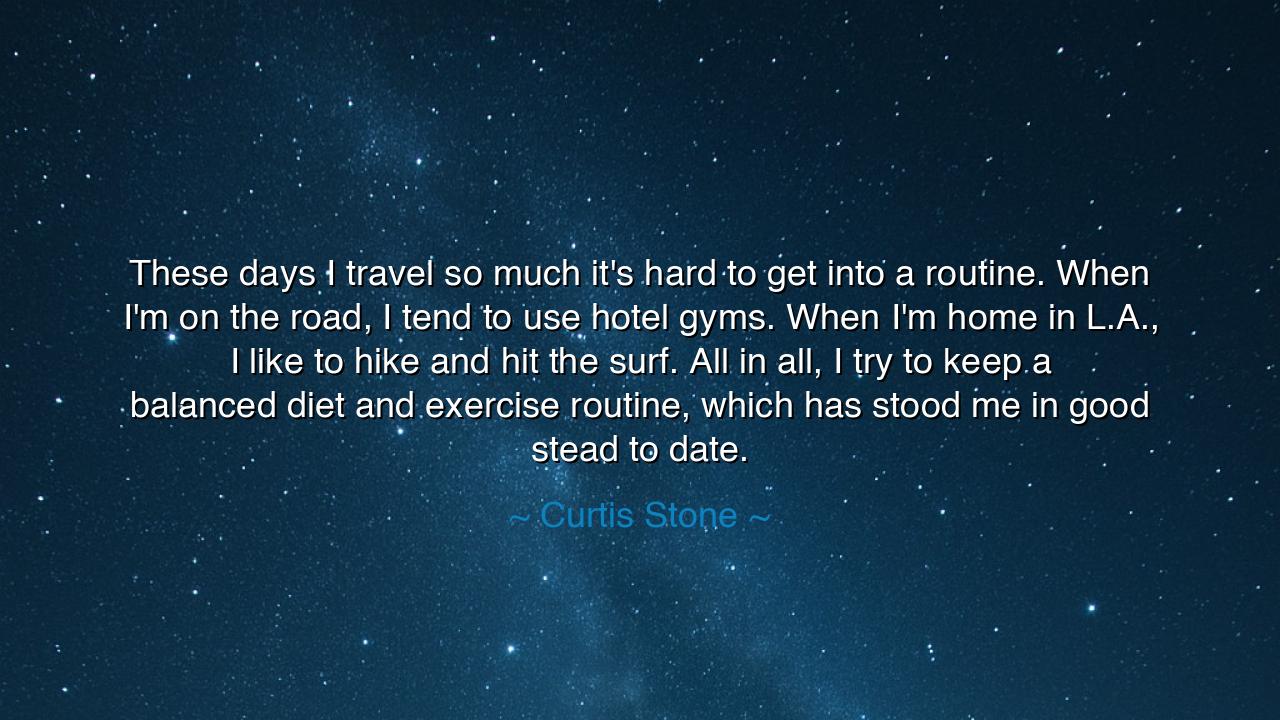
These days I travel so much it's hard to get into a routine. When
These days I travel so much it's hard to get into a routine. When I'm on the road, I tend to use hotel gyms. When I'm home in L.A., I like to hike and hit the surf. All in all, I try to keep a balanced diet and exercise routine, which has stood me in good stead to date.






Listen, O children of wisdom, to the words of Curtis Stone, a man whose life reflects the eternal pursuit of balance between body, mind, and spirit: "These days I travel so much it's hard to get into a routine. When I'm on the road, I tend to use hotel gyms. When I'm home in L.A., I like to hike and hit the surf. All in all, I try to keep a balanced diet and exercise routine, which has stood me in good stead to date." In these words, there is a timeless truth—balance is the key to a thriving life, and that balance is not always found in the comfort of routine, but in the adaptability and mindfulness with which we live our lives.
In the days of the ancients, the great philosophers and warriors understood that health and strength were born not from rigid schedules or perfection, but from a life lived in balance, embracing both discipline and flexibility. The Greeks—with their love for the body and mind—understood that health required constant attention, but also the ability to adapt to the demands of life. Socrates, for example, did not live a life of perfect routine, yet his constant quest for truth and virtue was grounded in balance—between thought and action, between work and rest. Curtis Stone echoes this ancient wisdom, understanding that while a rigid schedule is difficult to maintain, a life of flexibility and mindful habits leads to lasting well-being.
Consider the example of Alexander the Great, whose conquests spanned across nations, yet whose strength lay not only in his military might but in his ability to adapt to the ever-changing world around him. Alexander did not live by a single, unyielding routine, but adapted to the needs of his journey. His soldiers marched great distances, fought intense battles, and sought rest where they could find it. They knew that their health—mental and physical—depended not on perfect consistency, but on the ability to balance the rigors of war with moments of rest, relaxation, and recreation. Curtis Stone, too, has found that while his traveling and work may interrupt his daily routine, the ability to find balance through different means—whether it be through a gym, a hike, or the surf—keeps his body and mind in tune with the demands of his life.
The Romans, under the wise rule of Marcus Aurelius, also embraced the notion of balance in their lives. Aurelius, though a ruler and a warrior, was known for his deep philosophy and his practice of meditation. He recognized that the demands of power and governance required a balance between action and reflection, between work and self-care. His meditations remind us that the life of a ruler, or any person of ambition, must be rooted in balance—between duty and health, between the responsibilities of the world and the need to nourish the self. Curtis Stone speaks to this when he mentions his commitment to a balanced diet and exercise routine, understanding that his physical health supports his ability to succeed in his endeavors, whether on the road or at home.
In our modern world, where routine often feels like a distant dream for many, Curtis Stone shows us that the key to maintaining a strong body and mind is not found in perfection but in the small, adaptable habits that we cultivate in our lives. The gym offers a temporary solution while traveling, and the hike and surf provide the natural, joyous outlets when at home. This is a life well-lived, a life rooted in the understanding that health is not a product of perfection but of balance and adaptability. Whether we are in a hotel room or by the ocean, we can create moments of nourishment and strength through mindful practices.
The lesson here, O children, is clear. We live in a world where routines may be disrupted, where life constantly shifts, and where it may seem impossible to maintain consistency. Yet, like the ancients before us, we must understand that balance is the key to lasting health. The body, mind, and spirit thrive not from rigid schedules, but from the ability to adapt—finding health in exercise, whether it is in a gym, on a hike, or in the act of surfing the waves of life. In each of these moments, we nourish the body, calm the mind, and restore the spirit.
So, O children, let us seek to live lives of balance, as Curtis Stone teaches us. Let us find moments of nourishment, even in the busiest of times, and embrace the flexibility that life demands. Whether our days are spent in the stillness of routine or the ever-changing world of travel, let us remember that health is not a destination, but a journey—a journey of adaptation, mindfulness, and balance. Let us live this wisdom every day, knowing that in balance, we find strength, vitality, and peace.






AAdministratorAdministrator
Welcome, honored guests. Please leave a comment, we will respond soon